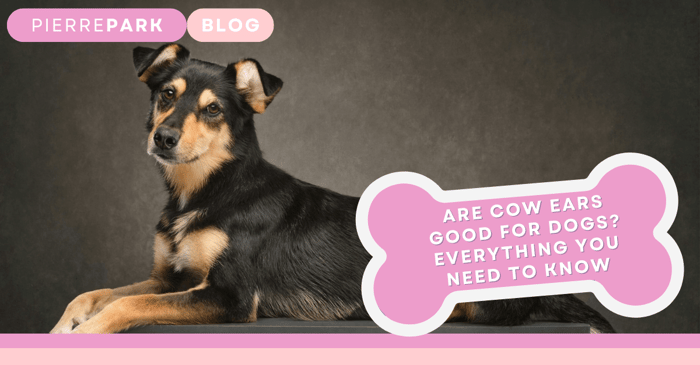Table of Contents
Cow ears are great treats to give your dog, as long as they are fed in moderation and not too tough for them to chew.
We’re big advocates for single-ingredient dog treats though, so this shouldn’t come as a surprise.
In this guide, we’ll cover the benefits of cow ears for dogs as well as some things to keep in mind when feeding them to your pup.
Let’s get straight into it.
What Are Cow Ear Treats?
Just so we’re on the same page, let’s quickly touch on what cow ear treats are and how they are produced.
Cow ear treats are made from cow ears which are a by-product of the meat production trade. These would typically be waste products, but are instead used to make cow ear dog treats (and with other animal products).
The ears are cleaned, boiled/steamed to remove bacteria, and then dried and baked.
This process removes all bacteria and makes the ears stable for shelf-life; once done, the ears are sealed and ready for sale.
Some brands may add preservatives or flavorings, but these are not necessary due to the production process, and high-quality brands will not include any.
Why Cow Ears Are A Good Option In Most Cases
Cow ears are a pretty good treat for any dog overall, as long as it has healthy teeth, is supervised while chewing, and doesn’t have special dietary needs that prevent it from eating them.
This is because cow ears only contain one ingredient and are not (usually) filled with added preservatives, additives, colorings, or anything else that isn’t actually needed in your pup’s diet.
Cow ears are high in protein and animal fat, and they can provide endless hours of mental stimulation as well, which is ideal for your dog.
Benefits Of Cow Ears For Dogs
Let’s explore some of the main benefits of cow ears for dogs.
Single Ingredient
The first and our personal favorite benefit is that cow ears are a single-ingredient treat - no surprises there, given the name.
We love treats with just one ingredient because they are not only transparent but also healthier for your pup, thanks to the lack of filler ingredients.
Lots of dog treats, and also dog food for that matter, contain filler ingredients that offer little to no nutritional value for your dog. This includes things like generic ‘meat’ and others like maize, soy, or potato (see ingredients to avoid here).
Cow ears only contain cow meat, which means they’re very nutritious. This is the case for most cow ear products, but as you’ll see shortly, some can contain added ingredients and should be avoided.
High In Protein
Cow ears contain a lot of protein, and more so than other animal ear products like pig ears.
The amount is usually anywhere from 80 - 90% on a crude basis, which is very high and great for most dogs.
Mental Stimulation
Another lesser-known benefit of cow ears for dogs is that they provide a lot of mental stimulation.
The reason for this is pretty simple. Cow ears are quite tough and can take a while to chew through, especially for smaller dogs, which means it keeps them occupied for a long time.
This provides a lot of mental stimulation and is a great way to keep your dog busy for a while.
When Cow Ears Can Be A Problem
Cow ears are not without their potential problems, though, and here are the main ones to keep in mind.
Choking Hazard
A fairly common problem with cow ears is that they can be a choking hazard.
This is more common for smaller dogs, or dogs who tend to eat more quickly. Smaller dogs can struggle to chew through particularly tough cow ears and may try to swallow at the end when the remaining tissue is still too large.
Big dogs may try to swallow the cow's ear after only chewing it for a little while, which can be a choking hazard.
The best advice here is to always supervise your dog when they have a cow ear. You’ll learn quickly if your dog is suited for cow ears or not, and make sure you know the procedure for helping them if they are choking.
Stomach Issues
When you introduce new treats to your dog, it can upset their stomach if they aren’t used to it.
This is the case for most treats, but it can be especially true for cow ears which can contain a lot of fat. Some dogs are also naturally more prone to stomach problems.
When you first give your dog a cow ear, start off with a small-sized ear and check for any signs of stomach issues afterward. In most cases, they will be completely fine, but there’s always a chance they might not suit your pup.
Teeth Problems
For smaller dogs, some cow ears can be too tough for their teeth to chew into.
Some cow ears can be a lot tougher than others as well, depending on how they are processed and particularly, how long they are baked.
This is also a problem for teething dogs or if your dog has any preexisting teeth issues.
Look Out For Added Preservatives/Flavorings
Not all cow ear products are the same, so it's always worth checking the ingredients for any added flavorings or preservatives.
The ideal cow ear product should only list cow meat on the ingredient list, it isn’t necessary for them to have preservatives or flavorings.
Smell
This one depends on if any flavorings are added to the ears.
Usually, cow ears should have a minimal smell, but they can sometimes give off a pungent, meaty smell if they’ve had flavorings added to them. if this becomes an issue, just try another brand that contains only cow meat and no added ingredients.
Puppies
Cow ears can be problematic for puppies, mostly because they can be quite hard and tough to chew through.
If your puppy is teething, it can also be an issue due to the toughness of the surface which can cause damage to their teeth.
For more information on feeding your puppy treats, check out our guide here.
Overfeeding
Compared to most dog treats, cow ears are pretty large and contain a lot of calories relative to a dog’s daily expenditure.
This means that they shouldn’t be a regular treat, and are better being fed once or twice per week as a treat. This isn’t a problem on its own, but if you start to feed your dog cow ears every day in place of meals, they will be losing out on other nutrition that they need.
How Often To Feed Your Dog Cow Ears
Once or twice per week is a good frequency for giving your dog cow ears, but this does depend on the size of your dog and how much exercise they’re doing.
The majority of their nutrition should come from their food, which is nutritionally complete, so as long as the treats do not interfere with that, it isn’t an issue.
The general rule of thumb for this is no more than 10% of their daily calorie count from treats.
Alternatives To Cow Ears
If your dog doesn’t get along well with cow ears for any reason, there are lots of alternative options that can work just as well.
Chew Toys
If you’re looking for something to distract your dog for a while and let them chew a simple chew toy can be a good alternative to a cow ear.
You can even use some peanut butter to add more flavor and keep them interested. Chew toys are a great alternative if your dog is prone to eating cow ears too quickly or if their teeth are not suited for them.
Sweet Potato Treats
For those seeking a single-ingredient treat option, our sweet potato treats offer an excellent solution. Made from 100% natural sweet potatoes, they deliver the wholesome simplicity that health-conscious pet owners value. Sweet potato's natural flavor appeals to most dogs, making them a reliable training reward or anytime treat.
Our careful dehydration process ensures consistent quality and a satisfying crunch. These treats have proven especially popular with owners who prefer clean, single-ingredient snacks for their dogs.
Yak Bars
Yak bars, or Himalayan chews, are extremely durable bars made from hardened cow milk.
These are quite similar to cow ears in that they last a long time and are very durable, they’re also quite high in protein and fat, so the composition is similar.
Yak bars also have the added benefit of being odorless, which is why many people prefer them.
Bully Sticks
Another alternative is bully sticks.
These are made from dried bull pizzle, giving them a similar flavor and nutritional composition to cow ears.
Bully sticks can become choking hazards though, so they should be given under supervision.
Wrapping It Up
Hopefully, after reading this guide, you’ve got a good idea of cow ears and whether they’re suitable for your pup.
In moderation, and for most dogs, they are great treats that can keep them entertained for hours.
Some dogs don’t get on well with them, either due to stomach problems, teeth issues, or eating too quickly, but it’s pretty easy to figure this out.
Lots of alternatives exist, so if your pup doesn’t get along with cow ears you can easily fill that gap.






